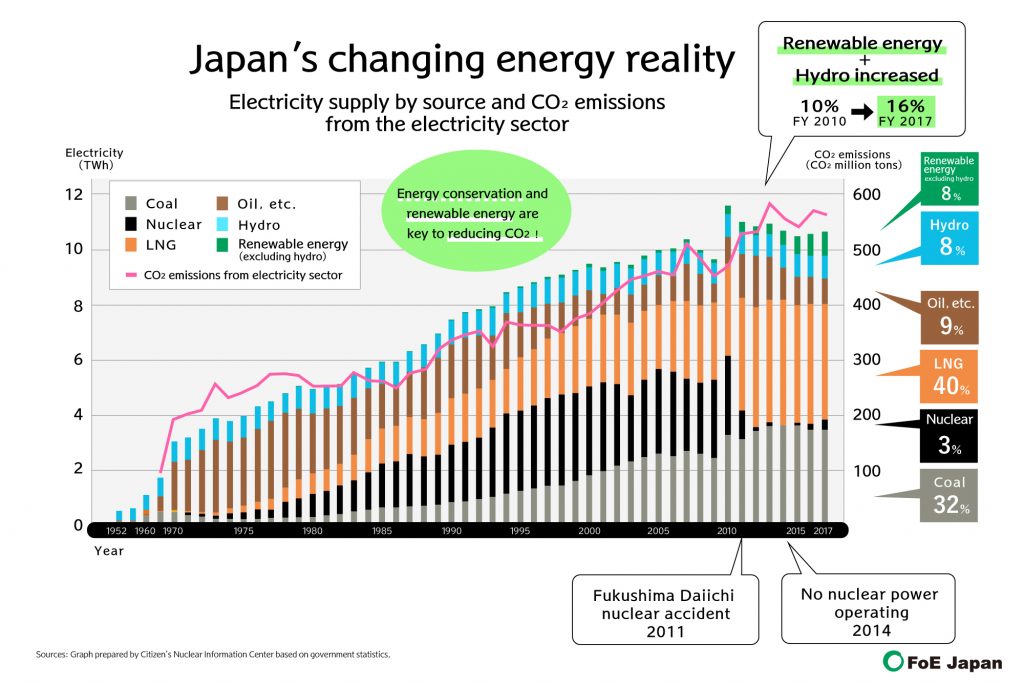Is nuclear power a solution for climate change?
In recent years the world has experienced an increase in the frequency and intensity of extreme weather events caused by climate change. Japan too has been hit by torrential rains, heat waves and other extreme weather. We urgently need to reduce anthropogenic greenhouse gas (GHG) emissions, which are the main driver of climate change. In particular, we need to rapidly decarbonize the energy sector, which is a major emitter.
In October 2018, the Intergovernmental Panel on Climate Change (IPCC) released the Special Report “Global Warming of 1.5ºC.” It concludes that in order to limit warming to 1.5°C, GHG emissions must be reduced by 45% from the 2010 level by 2030 and must reach net zero by 2050. In other words, over the next few decades we must significantly reduce the use of fossil fuels, which account for over 80% of primary energy consumption.
The Japanese government states that since nuclear power when operating has lower GHG emissions than other power sources, it can be seen as low carbon energy and as a measure against climate change. But nuclear power is not the right solution to the problem of climate change for many reasons, including for example, the unsolvable problem of nuclear waste, the fact of radiation exposure for workers, and the exorbitant cost of electricity generation from nuclear power.
North-south issues, disparity, injustice are embedded in climate change
FoE Japan has long warned against flawed attempts to address climate change—projects that cause environmental destruction and human rights violations but are promoted as climate solutions, and measures that are not really helping to fight climate change. Among them, nuclear power stands out prominently.
At the core, climate change is intensifying as a result of the privileged in the world—the wealthy class and wealthy countries—having developed economically while emitting large amounts of GHGs. Even today, poorer countries on the path to development are more vulnerable to climate change, while industrialized countries continue with mass production, mass consumption, and mass waste. In other words, we could say that the essence of climate change relates to North-South issues, disparities, and injustices. The concept of trying to rectify this situation is known as “climate justice.” Seen from the perspective of historical responsibility for climate change, developed countries should reduce their own GHG emissions as quickly as possible and provide support to developing countries. But if the sole aim is to reduce GHG emissions, we may still destroy nature and trigger more human rights abuses. Nuclear power illustrates this point, and the same could be said about non-sustainable forms of “renewable” energy.
The Paris Agreement, the international framework adopted in 2015 to address climate change, clearly states that in the context of addressing climate change we need to respect and consider human rights, health-related rights, indigenous peoples, communities and inter-generational equity. The point is that not every action should automatically be accepted simply if it can reduce GHG emissions. Rather, it is important to evaluate options comprehensively, from perspectives that also include sustainability and human rights, etc.
Nuclear power actually delays climate action
In Japan, even though nuclear power has been promoted as a means of mitigating climate change, the country’s GHG emissions have not decreased over the past few decades. Nuclear power props up a society of high electricity consumption that relies on large-scale and centralized power generation, and it actually hampers measures to promote renewable energy and conserve energy. It is worth noting that Japan’s GHG emissions began to decline after 2014, when virtually no nuclear plants were operating (see graph).

Figure: Electricity generation by source, and CO2 emissions in the electricity sector
Source: Prepared by Citizens Nuclear Information Center (CNIC) from various sources, including power contract information provided in “Annual Report on Energy in 2018” (Energy White Paper 2019) by Ministry of Economy, Trade and Industry, and annual editions of the “Handbook of Energy & Economic Statistics in Japan” compiled by the Institute of Energy Economics, Japan.
In recent years, the cost to build a nuclear power plant has increased to at least the trillion yen level. In 2018, the US National Academy of Sciences published a report on the role of nuclear power in combating climate change, and rejected its usefulness primarily on economic grounds.[1]
Indeed, it is ironic that nuclear power is also vulnerable to climate change. In 2018, many nuclear plants had to be shut down in countries including France and Sweden as outdoor water temperatures rose due to extremely hot weather and cooling water could not be maintained at a low enough temperature.[2] Another vulnerability of nuclear power is that if a reactor has to be stopped due to some kind of trouble such as a disaster or frequent accidents, the impacts on the supply of electricity ripple out to a large area.
First, we need to save energy and change lifestyles
For decades, Japan has been working to conserve energy. As a result, many people wrongly think it’s like trying to squeeze more water out of a dry rag. But is that really true? Vending machines and convenience stores can still be found everywhere, and Japan also produces a huge amount of food loss every day. Retail stores use excessive air conditioning. There is much room for improvement. Energy saving targets in the industrial sector lack ambition. People have warned about the limits of the global environment for years, but lifestyles have not changed much.
From the perspective of climate justice, individuals, organizations, and society as a whole need to work towards a society that values human rights, sustainability for future generations, and responsible consumption behavior.
[1] Jidson, Tim, Nuclear Power and Climate Action, 2018
[2] Quartz “Europes heatwave is forcing nuclear power plants to shut down”https://qz.com/1348969/europes-heatwave-is-forcing-nuclear-power-plants-to-shut-down/ August 6, 2018.

